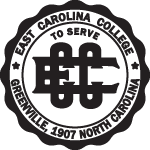
On June 25, 1963, the North Carolina state legislature passed its infamous speaker ban law prohibiting (1) known communists, (2) advocates of the overthrow of the U.S. government, and (3) persons who had taken the Fifth Amendment when asked about their affiliation with the Communist Party from speaking on a state-supported campus. The legislative measure issued from Cold War anxieties as well as racial concerns generated by international communiques announcing communist support for African-Americans in their struggle for civil rights. In the speaker ban law, the state legislature announced its opposition to many things, including speakers advocating civil rights for blacks.
The reaction at East Carolina was immediate: the ban was declared unconstitutional and as contrary to national ideals as any communist could be. ECC President Leo W. Jenkins remarked, “We are not afraid of Russian missiles or military might, so why should we be afraid of the ‘mouths’?” Jenkins informed the East Carolinian that he had contacted state legislators asking that the bill be repealed. Jenkins added, “We [have] found that debate on [the] comparative worth of democracy versus totalitarianism puts democracy in a very favorable light.”
An ECC student survey showed that the majority of those polled opposed the ban “because it infringed upon the right of freedom of speech.” On August 8, 1963, the SGA firmly opposed the ban, voting unanimously to send a letter to members of the state legislature calling for repeal of the ban and support for “free inquiry … essential to the continuance of a free society.”
Simultaneous with the controversy, East Carolina held a summer workshop, “Constitutional Democracy and Totalitarianism,” meant to educate social studies teachers in new approaches to teaching students about communism. Praising the workshop, Jenkins remarked that Americans cannot effectively oppose communism “by putting our heads in the sand and pretending it [communism] doesn’t exist.” Despite opposition from ECC and campuses statewide, the North Carolina state legislature refused to alter the ban.
Two years later, as state colleges and universities faced the prospect of losing accreditation and research funding due to the ban, a legislative compromise was struck. A commission appointed by Governor Bob Scott recommended that the law be amended to return authority over campus speakers to the boards of trustees of each of the state campuses. When the proposal was presented to the ECC board, it was approved, with the support of President Jenkins. The commission’s recommendations were subsequently introduced to the state legislature and passed.
While not a ringing affirmation of free speech, the new policy effectively voided the harsh speaker ban and control of campus speakers by the state legislature. Three years later, the revised speaker ban law was declared unconstitutional insofar as it violated First Amendment rights to free speech. However, the 1965 law remained on the books until the 1995 General Assembly voted to repeal it.
East Carolina was not alone in its opposition to the speaker ban: every state-supported campus denounced it. However, as a college intent on becoming a university, it was imperative that East Carolina exhibit the maturity and devotion to academic freedom that are hallmarks of the best schools. With the controversy, East Carolina, under the able leadership of its president, Leo W. Jenkins, more than rose to the occasion.
Sources
- “ban all evil.” East Carolinian. Vol. 38, no. 60. July 18, 1963. P. 2. https://digital.lib.ecu.edu/38828
- Campbell, Bob. “State Legislature Meets On Speaker Ban Law.” East Carolinian. Vol. 41, no. 18. November 11, 1965. P. 1. https://digital.lib.ecu.edu/38905
- “College Institute Continues, Sparks Wide Acclaim.” East Carolinian. Vol. 38, no. 62. August 8, 1963. P. 4. https://digital.lib.ecu.edu/38830
- “Communique.” East Carolinian. Vol. 38, no. 63. August 15, 1963. P. 1. https://digital.lib.ecu.edu/38831
- “Council Chairman Lauds ECC Communism Institute.” East Carolinian. Vol. 38, no. 63. August 15, 1963. P. 1. https://digital.lib.ecu.edu/38831
- “EC Trustees Accept Speaker Ban Policy.” East Carolinian. Vol. 41, no. 19. November 17, 1965. P. 1. https://digital.lib.ecu.edu/38906
- “Eminent Communism Experts Attend Political Science Meet.” East Carolinian. Vol. 38, no. 6. August 1, 1963. P. 1. https://digital.lib.ecu.edu/38829
- Forsyth, James. “So others say: Communists On Campus.” East Carolinian. Vol. 38, no. 62. August 8, 1963. P. 2. https://digital.lib.ecu.edu/38830#?c=0&m=0&s=0&cv=1&xywh=1639%2C1244%2C1467%2C1507
- Johnston, W. Lee. “Speaker Ban Law.” NCPedia. https://www.ncpedia.org/speaker-ban-law
- “State Communist-Ban Law Arouses Storm Of Protests.” East Carolinian. Vol. 38, no. 58. July 4, 1963. Pp. 1, 3. https://digital.lib.ecu.edu/38826 and https://digital.lib.ecu.edu/38826Stroud, Tommy. “Poll Reveals Pro’s, Con’s Of N C Legislative Action.” East Carolinian. Vol. 38, no. 58. July 4, 1963. P. 3. https://digital.lib.ecu.edu/38826
- “Student Senate Pens Protest Against ‘Communist-Ban Law.’” East Carolinian. Vol. 38, no. 62. August 8, 1963. P. 1. https://digital.lib.ecu.edu/38830
- Records of Leo Warren Jenkins' Tenure as President and Chancellor, 1960-1978, State Correspondence. File 02.06.04.103-107, Box 24. University Archives #UA02-06. J. Y. Joyner Library. East Carolina University. Greenville, N.C.
Citation Information
Title: The Speaker Ban Controversy
Author: John A. Tucker, PhD
Date of Publication: 2/5/2020